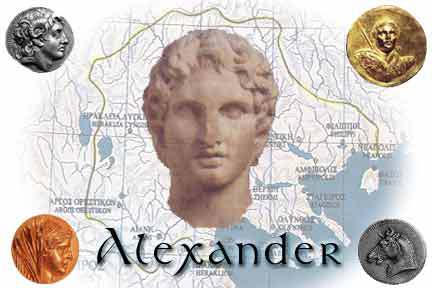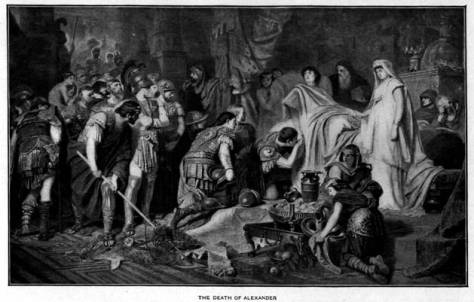.

.
French writer, politician, diplomat and historian François-René de Chateaubriand, said:
“If someone was compared to a god, that was Alexander.”
It was the Romans who named Alexander “Great.” They deified him. They considered him a role model and embraced the arts and sciences spread by him in the East. So, it was through them that Greek civilization and culture spread in the West.
Plutarch in his “Moralia. De Alexandri magni fortuna aut virtute” (Morals. About the Virtue or Fortune of Alexander the Great) wrote:
“States which never got to know Alexander were as though they had never seen the light of the sun.”
He also said:
“If one were to judge from what Alexander taught and did, he would verify that he was a philosopher.”
Alexander was the first person to regard all men as brothers before one God and that they should live together in harmony and as equal partners. This was Alexander’s vision and dream, which for centuries humans have been longing for.
Before he left Macedonia to undertake his expedition against the Persians, Alexander gave away his property and belongings. When asked what he would keep for himself, he answered “hope.”
In 326 BC, Alexander crossed the Indus river. There his army fought King Porus’ army in a region in Punjab. Alexander won the epic Battle of the Hydaspes.
Alexander never followed Aristotle’s advice that he should treat Barbarians (non-Greeks) differently than the Greeks. Alexander respected the traditions of the people he conquered. He eliminated discrimination and prejudice between the conquerors and the conquered.
Impressed by Porus’s bravery, Alexander made him an ally. He appointed Porus as satrap (governor) and gave him more territories – land that he did not own before – to govern. This strategy of choosing a local ruler as governor helped him control the conquered lands so far away from Greece.
East of Porus’ kingdom, near the Ganges River, was the Nanda Empire of Magadha. And further east was the Gangaridai Empire (of modern day Bangladesh).
After years of campaigning, Alexander faced mutiny from his exhausted Army at the Hyphasis River. Fearing the prospect of facing other large armies, they refused to march further east. And, so, the Ganges River, thus marks the easternmost extent of Alexander’s conquests.
Alexander tried to persuade his soldiers to march farther. But his general Coenus pleaded with him to stop marching further and return. Coenus said, “the men longed to again see their parents, their wives and children, their homeland”. Alexander agreed and turned south, marching along the Indus. Along the way, he conquered the Malhi (in modern day Multan) and other Indian tribes. He also sustained an injury during the siege.
After that, Alexander sent much of his army to Carmania (modern southern Iran) with general Craterus. He commissioned a fleet to explore the Persian Gulf shore under Admiral Nearchus. And, he led the rest back to Persia through the more difficult southern route along the Gedrosian Desert and Makran.
In 324 BC, about one year before his death, Alexander came to know that many of his satraps and military governors had misbehaved in his absence. He executed several of them as examples on his way to Susa. As a gesture of thanks, he paid off the debts of his soldiers. He also announced that he would send the over-aged and disabled veterans back to Macedonia, led by Craterus. Yet, his troops misunderstood his intention and mutinied at the town of Opis. They refused to be sent away. They criticized his adoption of Persian customs and dress and the induction of Persian officers and soldiers into the Macedonian units.
After three days, unable to pacify his men, Alexander gave Persians command posts in the army. He conferred Macedonian military titles upon Persian units. The Macedonians relented and begged his pardon. He forgave them.
Alexander then held a great banquet for 9,000 Greek and Asian officers at Opis.
Eratosthenes says that because of the great number of guests, many tables set. Alexander’s table was the largest and most prominent, and on it stood the crater which contained the wine for the libation.
Ptolemy says that along with Alexander sat Macedonians, Persians, some Greek seers, and some Magi (Medes). All those at his table drew for themselves wine from the crater on his table. Those at the other tables did the same from their craters. Thus, the whole assembly made one libation at the same time led, by the Greek seers and the Magi.
The occasion culminated with Alexander’s speech also known as Alexander’s “Oath”. Even today the leaders of states and international organizations consider it as their guiding light.
.
The “Oath” of Alexander the Great
(OPIS, 324 BC)
“Now that the wars are coming to an end, I wish you all to prosper in peace.
From now on, may all mortals live as one people, in fellowship, for the good of all.
See the whole world as your homeland, with laws common to all, where the best will govern regardless of their race.
Unlike the narrow-minded, I make no distinction between Greeks and Barbarians.
I am not interested in the origin of the citizens, or the race into which they were born.
I have only one criterion by which to distinguish them: their virtue.
For me, any good foreigner is a Greek and any bad Greek is worse than a Barbarian.
If disputes ever arise among you, do not resort to weapons, but solve them peacefully.
If needed, I will arbitrate between you.
See God, not as an autocratic despot, but as the common father of all so that your conduct will be like the life of siblings of the same family.
I, on my part, see you all as equal, whether you are white or dark-skinned.
And I wish you all to be not only subjects of the Commonwealth, but members of it, partners of it.
To the best of my ability, I will strive to do what I have promised.
Let us hold onto the oath we have taken tonight with our libations as a Contract of Love”.
Here is the Greek version:
Ο “ΟΡΚΟΣ” ΤΟΥ ΜΕΓΑΛΟΥ ΑΛΕΞΑΝΔΡΟΥ
(ΟΠΙΣ, 324 π.Χ.)
“Σας εύχομαι, τώρα που τελειώνουν οι πόλεμοι, να ευτυχήσετε με την Ειρήνη.
Όλοι οι θνητοί, απ’εδώ και πέρα να ζήσουν σαν ένας λαός, μονοιασμένοι για την κοινή προκοπή.
Να θεωρείτε την Οικουμένη Πατρίδα σας, με Κοινούς Νόμους, όπου θα κυβερνούν οι άριστοι, ανεξαρτήτως φυλής.
Δεν χωρίζω τους ανθρώπους, όπως κάνουν οι στενόμυαλοι, σε Έλληνες και Βαρβάρους.
Δεν με ενδιαφέρει η καταγωγή των πολιτών, ούτε η ράτσα που γεννήθηκαν.
Τους καταμερίζω μ’ένα μόνο κριτήριο, την Αρετή.
Για μένα, κάθε καλός Ξένος, είναι Έλληνας και κάθε κακός Έλληνας, είναι χειρότερος από Βάρβαρο.
Αν ποτέ σας παρουσιαστούν διαφορές, δεν θα καταφύγετε στα όπλα, παρά θα τις λύσετε ειρηνικά.
Στην ανάγκη θα σταθώ εγώ διαιτητής σας.
Τον ΘΕΟ, δεν πρέπει να τον νομίζετε ως αυταρχικό κυβερνήτη, αλλά ως κοινό ΠΑΤΕΡΑ όλων, ώστε η διαγωγή σας να μοιάζει με τη ζωή που κάνουν τ’αδέλφια στην οικογένεια.
Από μέρους μου, θεωρώ όλους, ΙΣΟΥΣ, λευκούς και μελαμψούς.
Και θα ήθελα να μην είστε μόνο υπήκοοι της κοινοπολιτείας μου, αλλά μέτοχοι, όλοι συνέταιροι.
Όσο περνάει από το χέρι μου, θα προσπαθήσω να συντελεσθούν αυτά που υπόσχομαι.
Αυτόν τον όρκο που δώσαμε απόψε με σπονδές κρατήστε τον σαν σύμβολο αγάπης.”
.
RELATED ARTICLES
- Alexander the Great (en.wikipedia.org)
- Ο Ορκος του Μεγάλου Αλεξάνδρου (framm.wordpress.com)
- Historical Sources Regarding the Contents of Alexander the Great’s Speech at Opis (helleniccomserve.com)
- Last three wishes of Alexander the Great (tvaraj.com)
.



